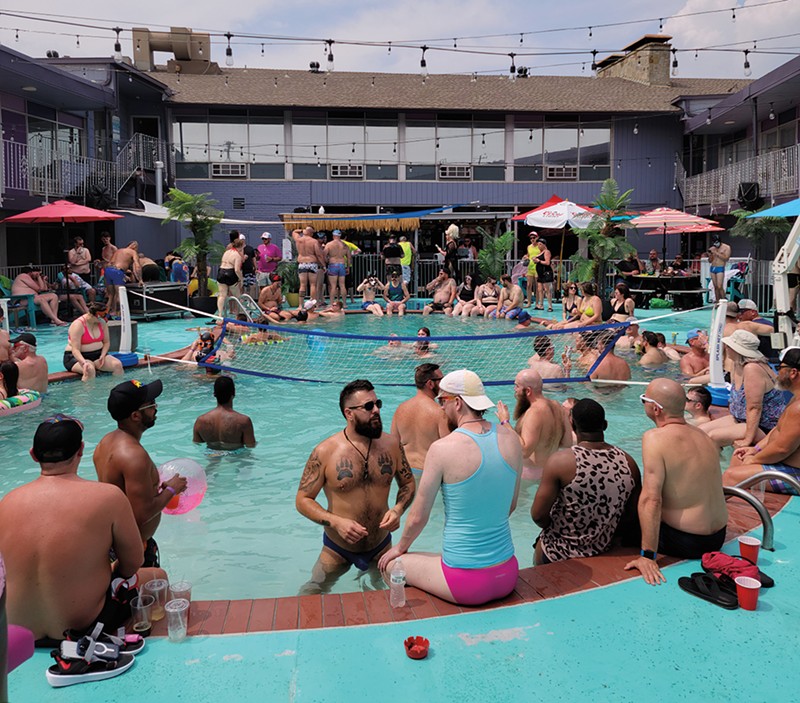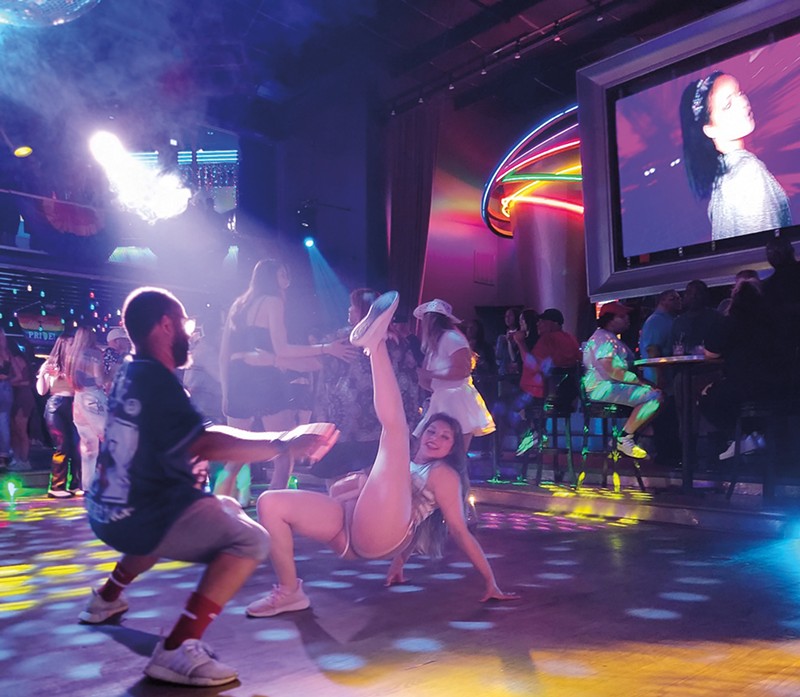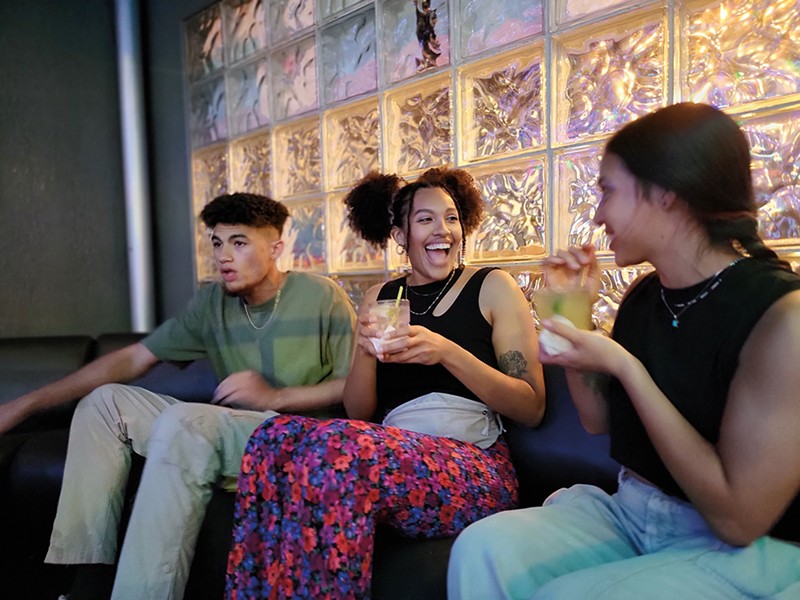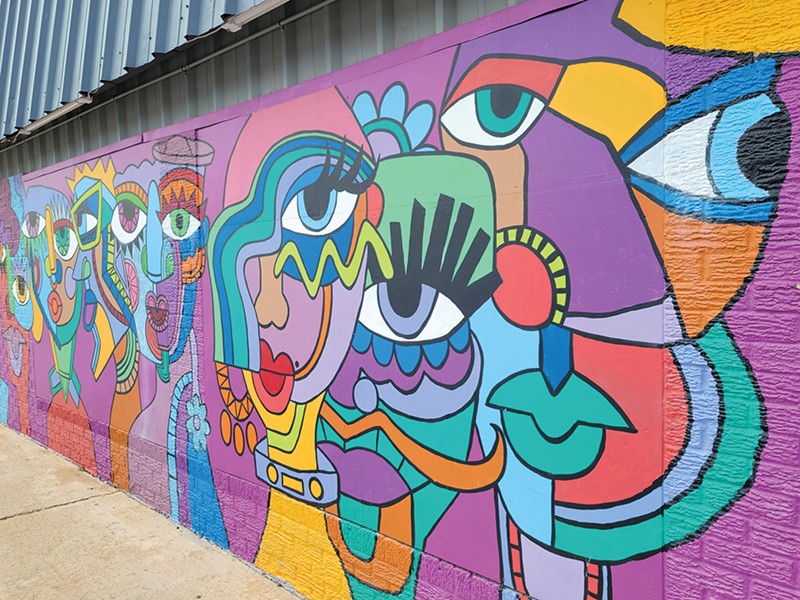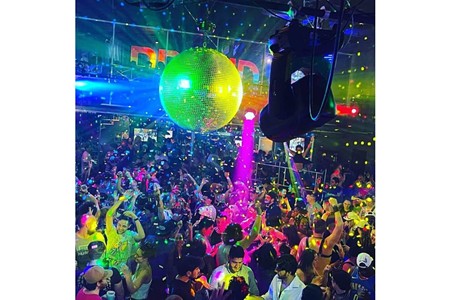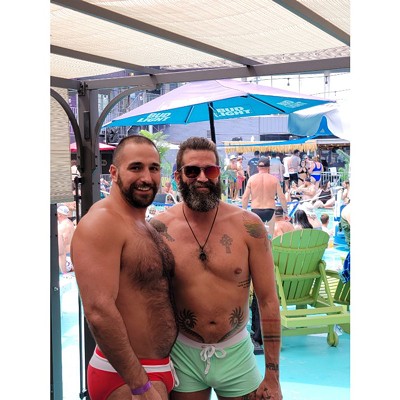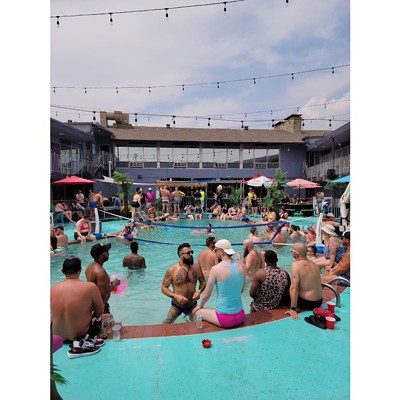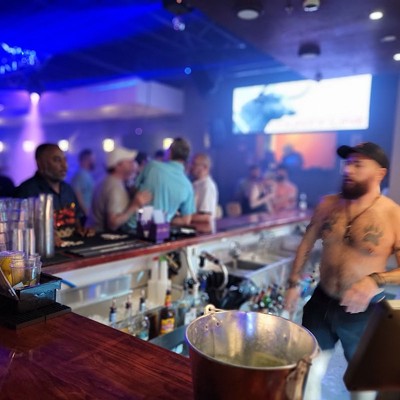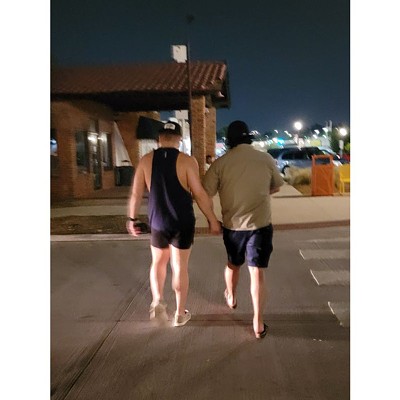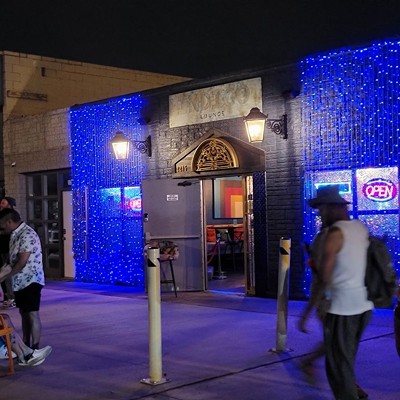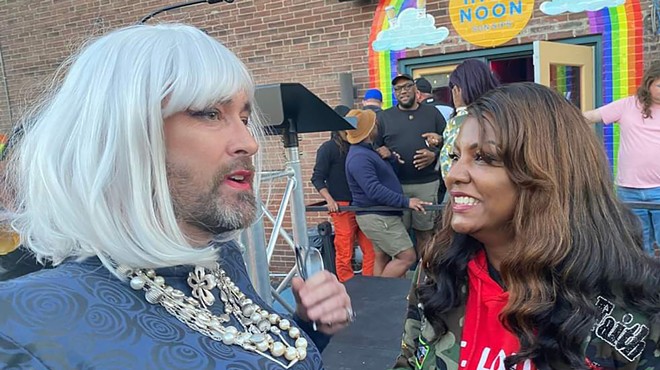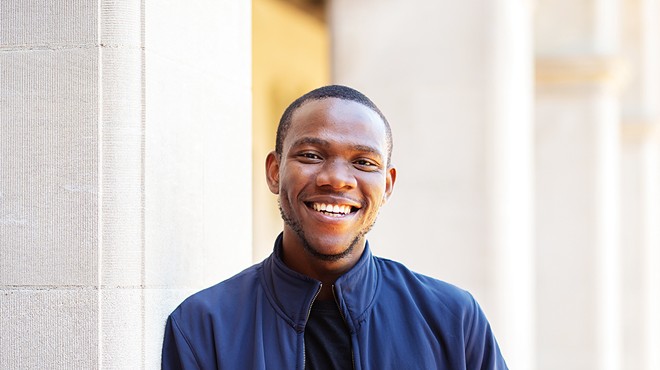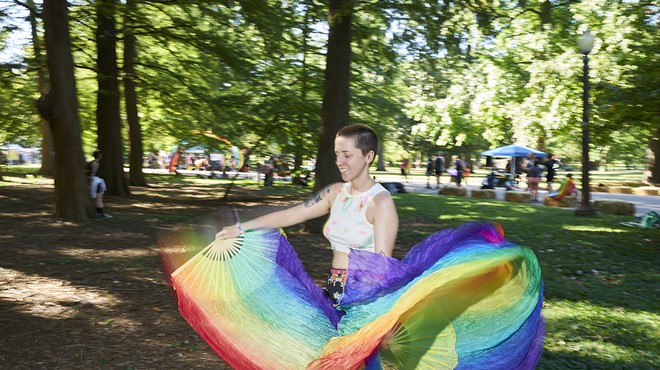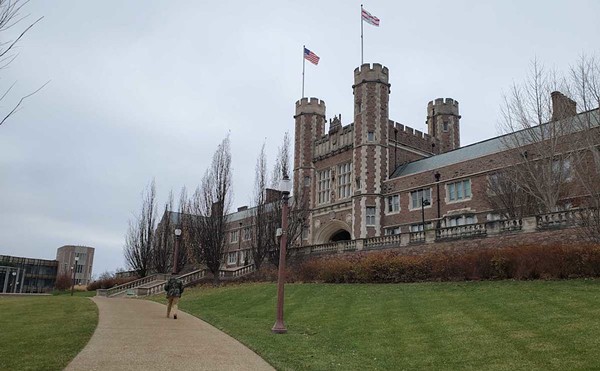We were hopelessly lost, two gay teenagers who sneaked away from Tulsa looking for the promised land but were now driving in circles because we couldn't read a map. My best friend Donald stared intently out the passenger window, seeming to search for landmarks to guide us. "What are you looking for? We don't know this town," I asked.
"I'm looking for a sign for the Habana," he replied, in reference to the queer hotel anchoring the 39th Street District, our desired destination.
Nothing sounded more ridiculous. It was the early '90s, and queer establishments back home kept a very low profile, avoiding unwanted attention.
"Oh right. Like they're going to have a sign for the Habana!" I said, rolling my eyes, and right on cue, there was a billboard-sized sign and the sprawling hotel for all of Oklahoma City to see. Bold as fuck.
A defensible district
Since the 1970s, 39th Street, which was once part of Route 66, had a string of queer bars known as "The Strip." Backing up to them was the 170-room Habana Inn. Built for travelers and conventions in 1968, the labyrinthine complex with its twin courtyards, two pools and sunken restaurant was considered dated and obsolete by the early 1980s and was languishing. Gays increasingly stayed there due to the proximity to the bars, so the straight hoteliers read the room and made the surprising and savvy business decision to go all in. They rented the hotel's vacant bar and restaurant spaces to queer businesses and advertised the Habana with the tagline "the Southwest's largest gay resort."
Around the same time, Scott Wilson and Don Hill shocked everyone when they opened the glitzy Angles, a high-energy, world-class dance club, a block away. While most queer establishments of the time were repurposed spaces patched together on a shoestring budget, Wilson and Hill spared no expense constructing their sleek, architect-designed megaclub with leather sofas, original artwork, elegant mezzanine lounges, huge disco ball, spiral staircase and soaring ceilings featuring state-of-the-art lighting on dramatic moving trusses.
See also: A look at the ongoing fight for LGBTQ right in MissouriThey got their permits approved by operating under the corporate name Cotton-Eyed Joes, giving city officials the impression they were building a mainstream country & Western bar. Those officials were not amused by the switch-a-roo. The Strip that a few years earlier was just a smattering of discreet bars seemingly overnight morphed into the main queer district of the Great Plains, rivaling Dallas' Oak Lawn. Well-connected by interstates 35, 40 and 44, LGBTQ+ people from hundreds of miles around began flocking to Oklahoma City every weekend.
Police were relentless in their targeting of Angles and the district, verbally and physically abusing patrons. Four months after Angles' September 1982 opening, the owners watched as police tore out the front doors of the club.
"That was the last straw," the owners told the Gayly Oklahoman. "That was the night that they took several people out and put them up against the patrol cars like they do when they frisk them, and took their nightsticks between their legs and just beat the hell out of them, beat them on the back and everything else."
See also: Barry Falke is changing Missouri's Red Cross for the betterIn February 1983, Cotton-Eyed Joes Inc. filed a federal lawsuit against Oklahoma City. The city settled for one dollar, agreed to provide gay-awareness training for its officers and agreed to obey a permanent injunction against the Oklahoma City Police that prevented them from coming onto N.W. 39th Street and harassing the community.
If it hadn't been for Cotton-Eyed Joes, this district would have been buried a long time ago. Angles, which is still open, has drawn performers including Sylvester, Divine, the Weather Girls, Dead or Alive, and Boy George. Joan Rivers attended a drag show where a queen impersonated her.
Openly gay City Councilman James Cooper, whose ward includes the 39th Street District, says police and the city have a positive relationship with the community today.
"I'd say LGBTQ folk are a microcosm of society, so many of the discussions we're having regarding Black Lives Matter, homelessness and mental health find themselves particularly pronounced with queer people," Cooper says. "Policy work coming from Mayor Holt's Homeless Task Force, his Law Enforcement Task Force and my Community Policing Working Group will help honor the Stonewall Riots and America's Civil Rights Movement. In the years ahead of us, in fact, we'll implement our policy recommendations, better connect OKC residents to mental health care and save lives, because everyone deserves dignity and equal treatment under the law."
A legendary hotel faced an uncertain future
The party at the Habana raged on decade after decade. The disco, the country bar, the cabaret, the gift shop, the pools, the poolside sunken restaurant with floor-to-ceiling windows and a massive chandelier, the endless twists and turns through the complex corridors and the cars circling the perimeter as people tailgated and the crowds wandered from venue to venue.
I moved to the area in 1993, days after high school graduation, and the Habana was a place where it felt like anything could happen. One of the four friends who moved from Tulsa with me met a guy from Colorado at the pool a month later, and moved to Denver with him the following day. I met a wealthy rancher from Amarillo who took me around the city in his chauffeured limousine (and was a perfect gentleman). An airman stationed two hours away in Wichita Falls, Texas, was tailgating when we met and wound up dating.
See also: A secret lesbian speakeasy where clothing is optionalBeloved local storyteller and "Mayor of Gay OKC" Floyd Martin has so many tales that I'm helping him to write a book. He was paid handsomely for his anecdotes about Joe Exotic, who stayed at the hotel often in the early '00s, but Tiger King producers didn't end up including the footage. One story was about Exotic bringing a full-grown leashed tiger to the hotel's crowded dance club.
"Joe's relationship with the hotel went south when he left three lion cubs in a room," Martin begins. "You can imagine at an all-gay hotel what I have seen through the windows over the years. However, these cubs were hilarious and put on quite a show, which a large group of us stood around and watched because they, the cubs, pulled the curtains down and destroyed that room."
By 2015, rumors were swirling that the Habana would join the rapidly growing list of vanished queer spaces. While business was relatively steady, the city was booming and the land was worth more without the aging hotel on it. The community breathed a sigh of relief in 2019, when Los Angeles-based Alternatives Resorts purchased the site, promising major upgrades. The property was briefly rebranded as Hotel Habana, and then became the District Hotel.
The relief was short-lived, though, when the two anchoring nightclubs vacated after acrimonious lease negotiations. A bartender who still had access to the security cameras released footage of the seemingly disgruntled owner ripping down the clubs' posters the night the bars closed.
Ownership turned to Steven Blundell, a longtime local nightlife fixture who built the DJ booth in one of the clubs four decades earlier, and offered him free rent to get a nightclub started. Blundell's biggest initial success was turning one of the hotel's pools into a full-blown party destination.
The District Hotel is seen almost like the family home for many, and when a queer Oklahoma Citian posts, "Meet me at the pool," it's likely they are referring to the hotel's pools. But while already popular, Blundell took one of the pool areas to a whole other level. Heaters allowed the season to begin in March. A booming sound system was installed as well as private cabanas, and performers from go-go dancers to drag queens can be found entertaining on elevated platforms.
Inside, a new country bar has taken off.
The successes were arriving too late for ownership, however, and at one point, Blundell says, the utilities were scheduled to be shut off in three days. Blundell knew if the hotel was to be saved, he would have to buy it. And so he did. He is the first queer owner in the hotel's history, and he's living and working on-site while overseeing renovations and operations.
"This place was fixin' to be lost, and now we're upgrading the rooms; we've got a Hollywood movie crew filming in the club — they put up a huge mirror ball for the shoot, and they're gifting it to us. Bigger mirror ball than Angles," Blundell says. His days are very long, but he's enjoying himself. "If I'm not having a good time, I'm not doing something right."
A revived district for us all
The 39th Street District has never been more vibrant. Covered in colorful murals, the area is home to 45 locally owned businesses — including several long-running bars like Angles — and the largest privately owned festival in the state: the annual OKC Pride Festival. A major streetscape project has beautified the area, and there are numerous entertainment options every night of the week.
I had a second stint living in Oklahoma City in the mid-'00s, and when my then-partner planned our landscaping revamp, I argued adamantly for keeping the old boxwoods lining the front of the house. The local growing conditions were so harsh, it seemed wrong to pull up anything that had somehow managed to thrive in that red dirt. I had reverence for those shrubs. They had earned their place.
I'm similarly reverent for the 39th Street District. In some of the nation's harshest political conditions, queer Oklahoma Citians laid claim to a few city blocks, invested in them and fiercely defended them. In an unlikely location, they built an entire district where one can park on Friday and not move their vehicle until Sunday, while safely being their authentic self and having an incredible time.
For LGBTQ+ travelers looking for community on the Red Plains, the District Hotel's marquis is a good sign.
To celebrate Pride, the RFT invited our sister publication Out in STL to take over the paper to showcase St. Louis' LGBTQ+ community. Read the rest of our Out in STL takeover:
See also: A look at the ongoing fight for LGBTQ+ rights in Missouri
See also: Barry Falke is changing Missouri's Red Cross for the better
See also: A secret lesbian speakeasy where clothing is optional
See also: Gabe Montesanti and Rocky St. Moore bonded over drag
Follow us: Apple News | Google News | NewsBreak | Reddit | Instagram | Facebook | Twitter | Or sign up for our RSS Feed

